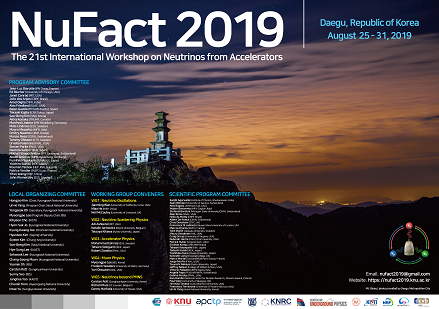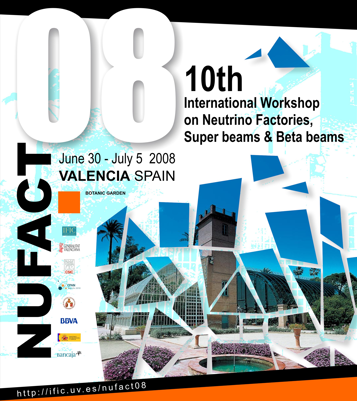
Neutrinos from Accelerators

NuFACT 2021 is the twenty-second in the series of yearly international workshops which started in 1999 and which had previously been called the International Workshop on Neutrino Factories. The change of name to International Workshop on Neutrinos from Accelerators signals that the workshop program has, over the years, come to include all current and future accelerator and reactor-based neutrino projects, including muon projects.
The main goal of the workshop is to review the progress of current and future facilities able to improve on measurements of the properties of neutral and charged lepton flavor violation, as well as searches for new phenomena. The workshop is both interdisciplinary and inter-regional in that experimenters, theorists and accelerator physicists from Asia, the Americas and Europe share expertise with the goal of reviewing currently operating experiments and designing the next generation of facilities.
The NuFACT 2021 workshop is divided into six Working Groups covering the following topics:
- Neutrino Oscillation Physics (Working Group 1),
- Neutrino Scattering Physics (Working Group 2),
- Accelerator Physics (Working Group 3),
- Muon Physics (Working Group 4),
- Neutrinos Beyond PMNS (Working Group 5),
- Detectors (Working Group 6)
For the first time, NUFACT2021 hosted a special session on Diversity, Education and Outreach. Three satellite workshops have taken place: NuStorm/ENUBET, ESSnuSB, and the diversity, outreach & education session. NUFACT2021 also featured an online full-interactive poster session.

NuFACT 2019 is the 21st in the series of yearly international workshops which started in 1999 and which had previously been called the International Workshop on Neutrino Factories. The change of name to International Workshop on Neutrinos from Accelerators is related to the fact that the workshop program has, over the years, come to include all current and future accelerator and also reactor based neutrino projects, including also muon projects, not only the Neutrino Factory project.
The main goal of the workshop is to review the progress of current and future facilities able to improve on measurements of the properties of neutral and charged lepton flavor violation, as well as searches for new phenomena beyond the capabilities of presently planned experiments. The workshop is both interdisciplinary and interregional in that experimenters, theorists, and accelerator physicists from all over the world share expertise with the common goal of reviewing the results of currently operating experiments and designing the next generation of experiments.
The NuFACT 2019 workshop is divided into five Working Groups covering the following topics:
- Working Group 1 : Neutrino Oscillation Physics
- Working Group 2 : Neutrino Scattering Physics
- Working Group 3 : Accelerator Physics
- Working Group 4 : Muon Physics
- Working Group 5 : Neutrinos Beyond PMNS

NuFACT 2018 is the twentieth in the series of yearly international workshops which started in 1999 and which had previously been called the International Workshop on Neutrino Factories. The change of name to International Workshop on Neutrinos from Accelerators is related to the fact that the workshop program has, over the years, come to include all current and future accelerator and also reactor based neutrino projects, including also muon projects, not only the Neutrino Factory project.
The main goal of the workshop is to review the progress of current and future facilities able to improve on measurements of the properties of neutral and charged lepton flavor violation, as well as searches for new phenomena beyond the capabilities of presently planned experiments. The workshop is both interdisciplinary and inter-regional in that experimenters, theorists and accelerator physicists from Asia, the Americas and Europe share expertise with the common goal of reviewing the results of currently operating experiments and designing the next generation of experiments.
The NuFACT 2018 workshop is divided into five Working Groups covering the following topics:
- Neutrino Oscillation Physics (Working Group 1),
- Neutrino Scattering Physics (Working Group 2),
- Accelerator Physics (Working Group 3),
- Muon Physics (Working Group 4), and
- Neutrinos Beyond PMNS (Working Group 5).

NuFact 2017 is the nineteenth in a series that started in 1999 as an important yearly workshop with emphasis on future neutrino projects. The main goals of the conference are to review the progress on studies of future facilities able to improve on measurements of the properties of neutrinos and charged lepton flavor violation as well as new phenomena searches beyond the capabilities of presently planned experiments. Since such progress in the neutrino sector could require innovation in neutrino beams, the role of a neutrino factory within future HEP initiatives will be addressed.


